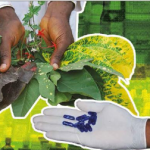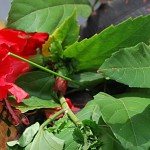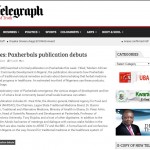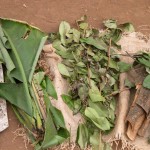Policy Voices are collaborations between ARI and leading practitioners in sub-Saharan Africa, which seek to inform policy through first-hand knowledge and experience.
Researcher Jamie Hitchen spent a fortnight in Nigeria during December 2014 working on a new Policy Voice entitled “Modern African Remedies”. Here, he reflects on his experience in order to offer readers a glimpse of what is involved in a typical ARI research trip.
I undertook several weeks of preparatory desk-based research on herbal medicine before leaving for Nigeria. This provided me with a rudimentary understanding of the salient issues before conducting interviews with medical practitioners, government officials, elected representatives and patients. I travelled to Ewu, in Edo State, to spend time with the practitioner-experts who would be the key voices in the publication.
The Policy Voice’s key contributor, with whom I spent the most time, was Father Anselm Adodo, a Benedictine monk who founded Paxherbals, the foremost herbal research institute and ‘home-grown’ producer of herbal remedies in the country. As research co-ordinator and editor of the publication, it was my role to conduct semi-structured interviews which teased out the key issues. I focused on what had driven the success of Paxherbals, the challenges it had encountered and its future trajectory. Rather than adopting a pre-determined direct line of questioning, I pursued interesting points that arose in discussion.
Observation was another crucial part of the research visit. I needed to understand how ‘Pax’ works operationally in order to edit appropriately. Spending time with Pax scientists in the laboratory was a chance to see, very clearly, the coming together of modern and indigenous knowledge. The longer I spent in Ewu, the more it became apparent that the Pax ‘story’ was about much more than herbal medicine: the successful economic and social development of a rural community,
In Lagos, I interviewed many individuals involved in different ways with the herbal medicine sector including Pax distributors, clinicians, patients and government representatives responsible for regulating the industry. This helped to provide context and to situate Pax within its industry.
Finally, the trip was a chance to increase awareness of ARI’s work. We place great emphasis on ensuring that our publications are widely read in Africa and gain the attention of policymakers and others with influence. I plan to return to Nigeria in November with ARI’s Director, Edward Paice, to present “Modern African Remedies: Herbal Medicine and Community Development in Nigeria” to a Nigerian audience.
Further Reading
- A. Elujoba et al, “A Comparative Assessment of Herbal and Orthodox Medicines in Nigeria”, Research Journal of Medical Sciences, 2011, Vol.5, No.5, pp. 280-285
- C. Masango et al, “Major Challenge and Constraint of Documenting Indigenous Knowledge about Africa’s Complementary and Alternative Medicine (e-ACAM)”, Paper presented at International Conference on ICT for Africa 2013, February 20-23, Harare, Zimbabwe
- Father Anselm Adodo OSB, “Nature Power: Natural Medicine in Tropical Africa”, AuthorHouse, 2013
- O. Awodele et al, “Towards integrating traditional medicine (TM) into National Health Care Scheme (NHCS): Assessment of TM practitioners’ disposition in Lagos, Nigeria”, Journal of Herbal Medicine, 2011, Vol.1, No.3, pp. 90-94
- O. I. Isola, “The “Relevance” of the African Traditional Medicine (Alternative Medicine) to Health Care Delivery System in Nigeria”, The Journal of Developing Areas, 2013, Vol.47, No.1, pp. 319-338
- P. Shetty, “Integrating modern and traditional medicine: Facts and figures”, SciDev.net, 20 June 2010
- R. Gyasi et al, “Public Perceptions of the Role of Traditional Medicine in the Health Care Delivery System in Ghana”, Global Journal of Health Science, 2011, Vol.3, No.2
- T. Adefolaju, “Traditional and orthodox medical systems in Nigeria: The imperative of a synthesis”, American Journal of Health Research, 2014, Vol.2, No.4, pp.118-124
- W. Birhan et al, “The contribution of traditional healers’ clinics to public health care system in Addis Ababa, Ethiopia: a cross-sectional study”, Journal of Ethnobiology and Ethnomedicine, 2011, Vol.7, No.1
- “Traditional Knowledge”, African Regional Intellectual Property Organization
- “WHO Traditional Medicine Strategy 2014-2023”, World Health Organization, 2013












